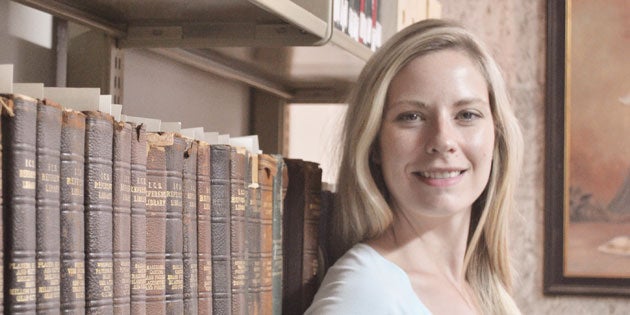Jenny France, a reference librarian at the College of Charleston’s Addlestone Library, wants to set the record straight: The library field may be synonymous with matronly, bespectacled women hushing visitors and towering stacks of dusty, old tomes, but France contends that it would be a mistake to write libraries off as a relic of the analog age. In the following Q&A, she shares insights on how the profession has evolved with technology and how the people behind the reference desk might be different than you’d expect.
Q: Why did you decide to become a librarian?
A: The library was a constant for me in college, I was there often. I changed my major several times (ultimately deciding on religious studies), so I spent a lot of time there researching different things. I also was drawn to the public service aspect of it.
Q: What was your master’s program like?
A: To work as a librarian in most libraries you have to have a master’s in library and information sciences from an American Library Association accredited school. I received my master’s from the University of South Carolina’s program, which is a two-year program. You choose between a few possible tracks, so you concentrate in either academic libraries, special libraries (those with highly specialized collections for instance at a company or museum), K-12 schools, or public libraries. I chose special libraries but ended up working in public libraries immediately after school and now I’m in an academic setting, so there is some room to change.
The classes in library school were kind of split between the library side and the information sciences side; some of it is more science based, like cataloging, statistics and research methods, and some of it is about ethics, teaching and learning, advocacy, et cetera. Electives include classes such as storytelling, digital archives and planning library facilities.
Q: Is being a librarian what you expected it to be?
A: It is in most ways, but there are surprises all the time. One thing that attracted me to the field is that you never know what kinds of questions you’re going to get, so you’re constantly learning. I’ve also been surprised by how quickly technology changes things in libraries, so keeping up with the rapidly changing digital literature and research industries isn’t something I anticipated when I was in school.
Q: What are some ways your job has been affected by technology?
A: When I was in library school, ebooks hadn’t hit the digital shelves yet. That alone has had a huge impact on libraries. Technology has also changed the way people look for information – we have to change our tactics as the way people search for information changes. I think people think the profession is becoming obsolete in light of Internet access, when it actually makes the profession even more imperative; the more information that’s available, and the more ways there are to access it, the more necessary it is to have the skills to find, research and evaluate that information.
Q: What are the biggest challenges associated with being a librarian?
A: Mostly working on the fly with reference questions you can’t have prepared for. For example, at the American College of the Building Arts where I also work as a librarian, there’s a student who is looking for information on 17th-century brick-making technologies that he could incorporate into contemporary designs, or sometimes I’ll get people who are remodeling their homes and looking for period-correct hardware and finishings. They may come in with a door knob, lantern, or picture of plasterwork and they’re looking to find the style and time period. Then it becomes my job to help them find resources that will answer their questions.
Q: What qualities make a good librarian?
A: It’s definitely a service-oriented position, so you have to be interested in that. It entails working directly with other people a lot of the time. Also you have to have patience, since often people might have an idea of what they’re looking for but they haven’t figured out how to verbalize it. I will try to dig deeper and identify what they need and how I can help. Finally, you have to be adaptable to change, since technology is changing the profession all the time!
Q: Have you discovered any favorite books from working in a library?
A: Hands down my favorite author who I found from working in libraries is Pam Houston. She writes quirky, sharp stories about wilderness, adventure and human relationships. My favorites of her books are Waltzing the Cat and Cowboys are My Weakness.





